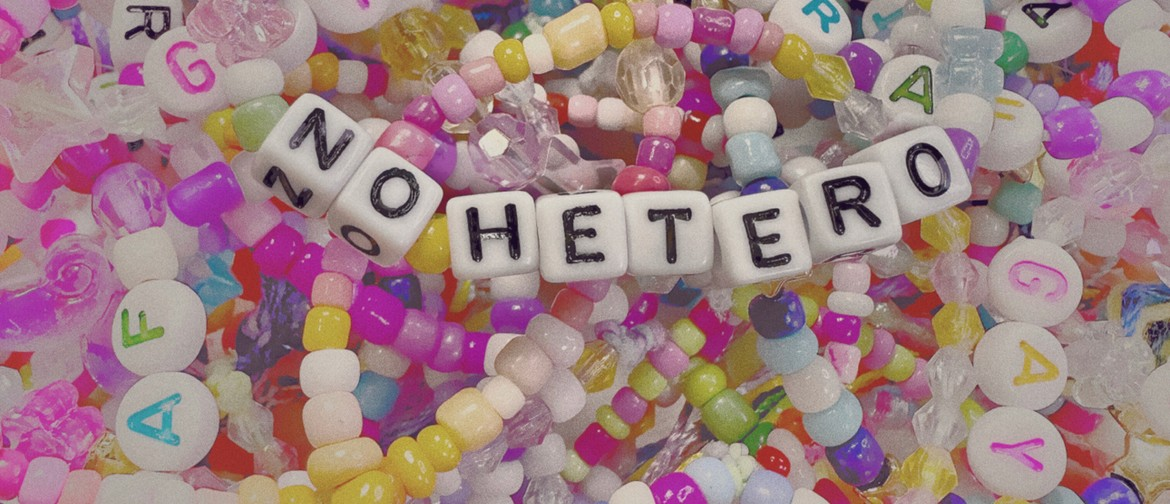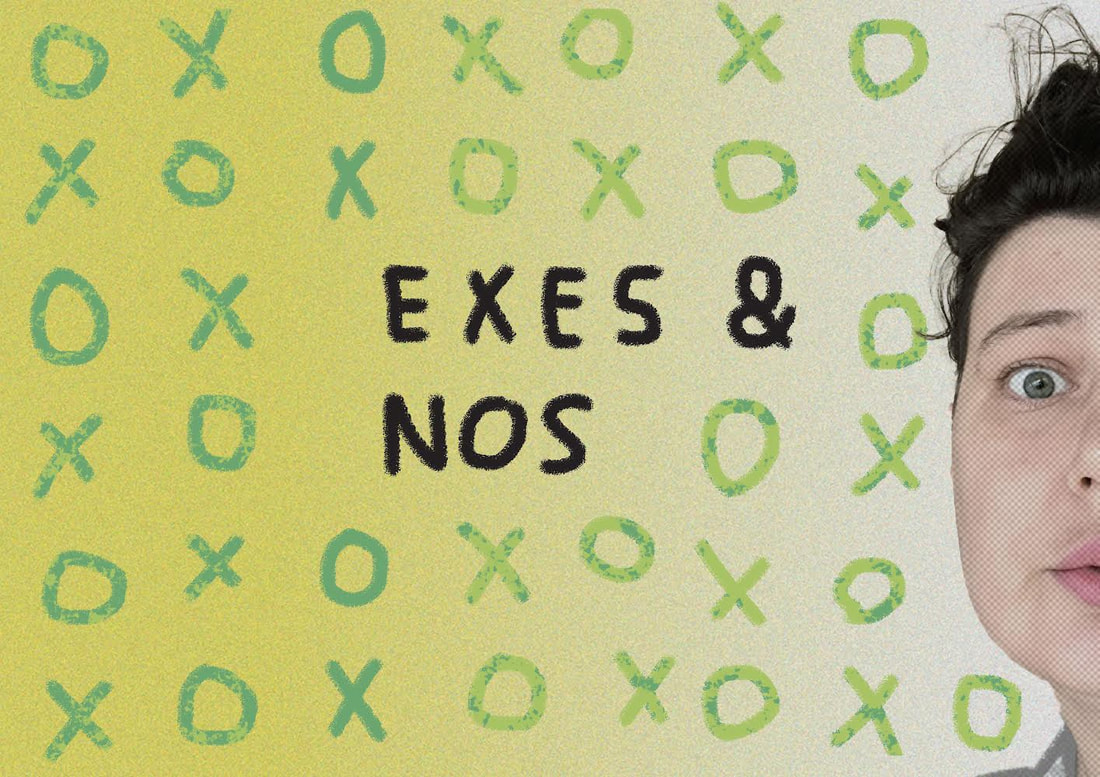Jack McGee
No Hetero
Before I can talk about No Hetero, I need to talk about preview showings. The specifics of what exactly a preview is depends on the show, but broadly, they’re an opportunity for an audience and some press to see a show before it opens. Generally, this is in the aid of building some buzz and word of mouth for the core season, getting some pull-quotes, etc. If it’s open access and you charge for it, the audience accepts that they’re getting pretty much the full show. If it’s unpaid, maybe a shoulder tap situation, you accept you’re probably watching something unfinished - a dress run.
The reason I digress about this is that this preview was a paid, open access, event. I get the impression that my expectations of what the word preview means in that context, differ from the artists’. Multiple times throughout the show, Wilson refers to the performance as a dress run, and to be frank - it feels like it. On the one hand, okay! This is a Fringe show, it’s going to be messy around the edges, and the tone of the show is deliberately very informal and personable. It’s not the end of the world. On the other hand, the constant reminder that we’re watching an unfinished version seriously undercuts my enjoyment of the show.
It’s one thing to have mismatched expectations as an audience member - although I think the conversation of whether or not charging for a dress run is fair, is an interesting one - but it’s another to regularly remind your audience of what they’re missing. Wilson is so determined to break down the fourth wall between her and the audience with No Hetero, that she regularly talks as if she’s watching it with us. This is the part of the show when… or, This is what’s supposed to happen here (paraphrasing) are regular sentiments. I am honestly shocked to find the show had started, as the informal tone of Wilson’s opening housekeeping patter bled seamlessly into the show itself (there’s no tech changes to help her out either). Overall, my biggest struggle is that No Hetero doesn’t feel like it holds itself with much respect or self importance. This makes it really difficult to become involved with it as an audience member. There’s many an anecdote that blurs into the next as it’s not fully asserted to us, tossed to the side before they’re allowed to fully exist.
Tech issues regularly interrupt proceedings, and I seriously feel for Wilson as she battles her way through them. There’s always going to be these kind of surprises, especially with a Fringe show, but I don’t think it’s an unfair critique - especially when coupled with the general self-undermining tone of the show highlighting them - to say that many of these could’ve been worked out behind closed doors, without a paying audience.
This all being said, Wilson has plenty of good jokes and compelling anecdotes to share. The show takes us on a journey through years of self-denied queerness, and she mines plenty of comedy from how obvious her feelings for women look in hindsight. There’s a few moments that catch me off guard in the best way, either for how outrageously, defiantly, queer they are, or the opposite. The show is rarely funnier than in her takedowns of garishly performative straight people culture, all framed through a lens of good natured self depreciation. Engagement announcement Facebook posts of the 2010s are a crime.
Scenography wise, it’s the most transformative show I’ve seen in the Circus bar. The stage has a delightful D.I.Y Christian-Bible-Camp quilt as a backdrop, and there’s a gorgeous little campfire as well. But my favourite part of the show is the final quarter. Once Wilson is fully confident in her identity as a lesbian, she reflects back on some of these earlier scenarios and is able to draw some very perceptive observations about the lies we tell ourselves under the long-cast shadow of heteronormativity. Wilson manages to convey the deep joy that comes with not only knowing what you want, but having the agency to choose it for yourself. Framed as a hugely community-oriented work, with custom made friendship bracelets available that celebrate a range of queer identities, I think No Hetero’s rich ending ensures that it succeeds in serving its queer audience. My hope is that come its Fringe season, the show as a whole is presented with dignity and craft befitting of its content and aspirations.
A deeply personal work, Exes and Nos consists of a series of ukulele songs written by Mercer over literally a ten year span. She describes the process of writing them, as a way to deal with various heartbreaks or struggles throughout her life. This lends the show a compelling, time-travel-esque quality: we’re getting these very intimate glimpses into who Mercer has been at various points in her life. In some ways, these songs feel like they could exist as an installation - something we could wander through and dip in and out of - building a picture of this transitory, ever shifting, ever changing person, who retreated back to her bedroom time and time again to process life through these songs.
Mercer is endearingly sincere. Her more political songs are deeply felt and a little bit punk, relishing in good natured defiance of shitty systems and bogus authority. Even her satirical songs are infused with a deep pathos, and she sings each number as if she’s still trying to ground herself in the feelings of it. Whatever demons she dealt with by writing the song, it feels like she’s still exorcising now. It’s hard not to root for her in this, we’ve all been through similar or adjacent experiences and are thrilled to see her come to terms with tough moments and ultimately prevail.
Unfortunately, the framing of them as an hour-plus long stage show is a hard sell. While Mercer is clearly a skilled singer, there’s not a ton of variation and by the fifth or six song, despite her best efforts, they seriously begin to bleed together. There’s only so many different vibes you can get with a ukulele, and Mercer definitely has a house style that she settles into time and time and again. It’s a lot of one flavour to take in one go, and the fact that Mercer draws it out by inserting another intermission midway through actually exacerbates this, as it makes the hour feel even longer. The songs are also so personal, that we’re often left feeling a little like we’re prying, and that we’re seeing something much more for her than for us.
The patter that intersperses the songs is very self effacing and often quite funny. She builds a character here, occasionally telling us slight lies (which she corrects later on) in the aid of clear characterization. This more performative tone contrasts directly with the sheer sincerity of the songs (though as the show progresses the spoken sections are increasingly used as a way to vent more earnest thoughts). Mercer uses a CPR dummy with wigs to stand in for each of the men who inspired these songs, a fun conceit that gives the show some much needed structure. However, these sections are fairly brief, and exist to contextualise the songs that follow them. They don’t succeed for me in ever really breaking up the tone of the show, or giving me the distance to process the raw emotion coming through the songs.
I will say, after the show I spotted an audience member come and have a chat with Mercer, and share some things that really touched them about the show. There’s so much heart on display here, that if this is a form that works for you, I’d be shocked if you didn’t feel somewhat seen by Exes and Nos. It bounced off me but it clearly didn’t for this audience member and frankly, I’m a little jealous of the experience they had. There’s a real debate to be had here on how we frame our most vulnerable, personal art. How do we contextualise these works of blinding intimacy? What is best kept for us and what do we share with the world? I have my answer. I’m sure this audience member who really connected with Exes and Nos has a different one. You can make up your own mind.
Double Bill
Overall, as stated, I think these shows make a lot of sense together. The shared time-travel-esque-feeling through similar eras makes them feel like two parallel journeys. They're both works of extreme vulnerability, and tonally compliment each other. However, running at two hours and forty minutes seriously affected my experience of the two shows. Starting late, with two intermissions, resulting in forty minutes of extra time in the sauna-hot-halls of Circus Bar works against both shows interests. I really hope that by Fringe this is tightened up, as people will be running in and out to attend other events. Still, if you’re going to see one of these, see both. They’re enriched by each other.







